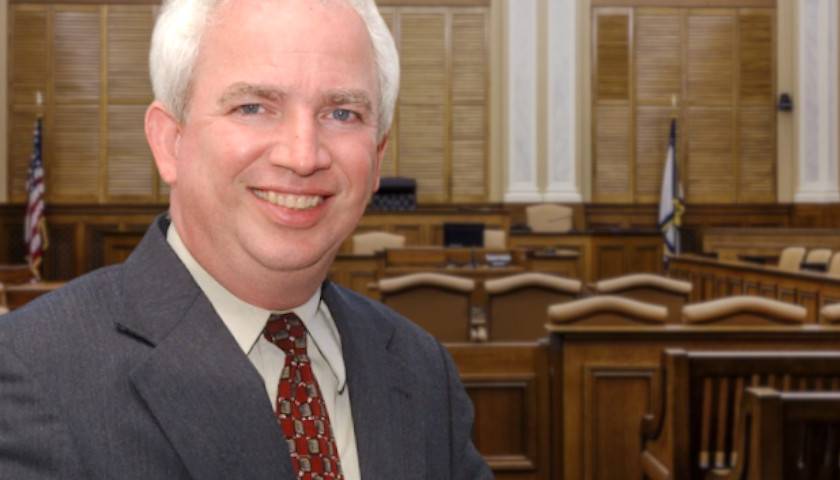The disbarment trial of former Donald Trump attorney and constitutional scholar John Eastman for his role advising the previous president about challenging the 2020 presidential election resumed on Thursday after almost a two-month break caused by conflicting schedules among the parties. It was scheduled to resume on Tuesday but was postponed for two days due to Eastman’s brief arrest in Georgia as one of the 18 people along with Trump who were indicted for their efforts investigating election fraud after the 2020 election.
The State Bar of California put Matthew Seligman on the witness stand all day, asking the fellow at the Constitutional Law Center at Stanford Law School whether there was legal precedent for a vice president acting as president of the senate to reject electoral votes. Seligman said he does not believe election fraud occurred in the 2020 election. He does not appear to have any experience in elections until 2020. His previous work includes papers like “Moral Diversity and Efficient Breach” in 2019 and “The Error Theory of Contract” in 2018.
On March 30, Seligman testified before the House Weaponization of the Federal Government Subcommittee and denounced Republican members of Congress who expressed concerns about election fraud. Seligman said their fraud claims were “false,” singling out Representative Jim Jordan (R-OH-04). He said regarding Jordan’s tweet that Democrats were trying to steal the election, “[T]hose elections are, without question, fundamentally sound. These falsehoods form the foundation of an unprecedented effort to reverse the efforts of a presidential election.”
Much of California bar attorney Duncan Carling’s direct examination of Seligman consisted of asking him about previous historical disputes over electoral votes where the vice president did not take a substantive role in accepting them. Carling also asked him about evidence that appeared to show vice presidents may have that authority. Carling cited the 1886 legislative debates that led up to the Electoral Count Act (ECA), where opponents of the ECA worried the proposed law might infringe on the authority of the president of the Senate regarding electoral votes. Seligman dismissed the seriousness of the remarks, saying they were “politically motivated statements.”
Similarly, when asked about instances Eastman cited as historical authority for vice presidents having substantive powers to reject electoral votes, Seligman claimed Eastman’s interpretations weren’t valid.
Seligman said no vice president has ever exercised substantive authority regarding accepting electoral votes. Legal commentator and constitutional attorney Robert Barnes disagreed, posting on X, previously known as Twitter, “He’s wrong. See John Adams 1796 and Thomas Jefferson 1800.” Eastman’s legal team will have the opportunity to cross-examine Seligman about those situations on Friday.
Seligman acknowledged that the ECA allows Congress to resolve electoral disputes in a few narrow areas. He said the 2020 election didn’t qualify since the disputes had all been settled by the states. A poll from Rasmussen reports in December 2020 found that almost half of voters believed there was fraud in the election.
During his testimony, Seligman referred to the amendment to the ECA, which Congress passed in December 2022. It added a section that stated that the vice president does not have the authority to reject electoral votes. NPR said it was necessary because “[f]or years, legal scholars have worried the law was poorly written and in need of clarification.” Bar Disciplinary Judge Yvette Roland, who contributed recently to Democrats while serving as a judge, told Seligman she was unfamiliar with the amendment and asked him to explain it to her.
Seligman acknowledged that the California bar asked him in advance to review the charges they intended to file against Eastman. He admitted he provided the bar with advice. Eastman’s attorney, Randy Miller, asked him whether his law license was active, pointing out that it appears to be inactive on both the California bar’s website and the Washington D.C. bar’s website, where he used to live. Roland shut down the line of questioning, stating that it was getting into “work product privilege.” It is a violation of law to practice law without a license.
Even though Seligman advised the California bar on going ahead with charges against Eastman over his views on the vice president’s authority to reject electoral votes, Seligman prominently features a debate between Eastman and progressive legal scholar Lawrence Lessig on that issue on his website.
Roland overruled almost every single objection by Miller. Eastman’s attorney objected multiple times to Seligman testifying about topics that had not been disclosed in advance to Eastman’s team, which is required by bar rules, and he also objected to having Seligman’s reports admitted into evidence for the same reason.
After this week, the trial will not resume again until Tuesday, September 5. The trial is livestreamed.
– – –
Rachel Alexander is a reporter at The Arizona Sun Times and The Star News Network. Follow Rachel on Twitter. Email tips to [email protected].





